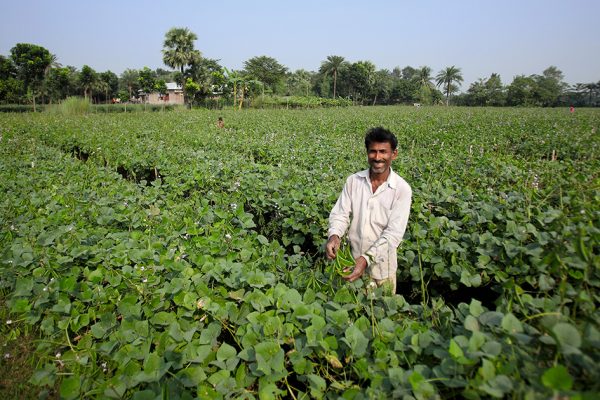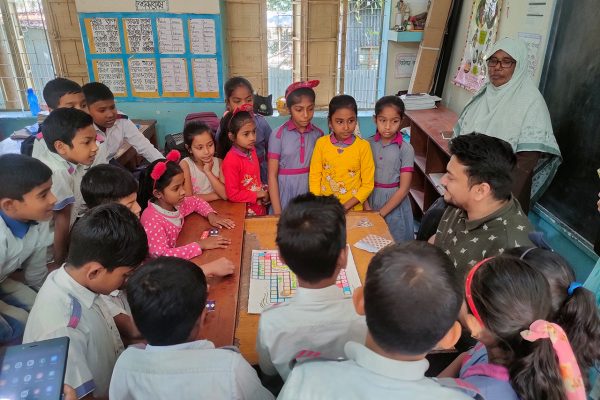Mind over money
Reading Time: 4 minutes
Nazia Moqueet is a Research Associate at BRAC Development Institute and is currently based out of BRAC USA. In March 2013, she was in Yemen to conduct a process evaluation of the CGAP-Ford Foundation Graduation Pilot. She conducted several participant and staff interviews and focus group discussions over a period of two weeks. In this post, originally published at the CGAP-Ford Graduation Pilot program blog, She recalls an encounter with a pilot participant in Taiz.
Nazia Moqueet is a Research Associate at BRAC Development Institute and is currently based out of BRAC USA. In March 2013, she was in Yemen to conduct a process evaluation of the CGAP-Ford Foundation Graduation Pilot. She conducted several participant and staff interviews and focus group discussions over a period of two weeks. In this post, originally published at the CGAP-Ford Graduation Pilot program blog, She recalls an encounter with a pilot participant in Taiz.
From a prison cell in Saudi Arabia, where he was wrongly held for drunk driving, to a confident and active leader in his village in Taiz, Hamood Ghalib Al-Saroori has come a long way. As the 52-year-old father of nine children relates his story from his newly-built brick house, there is an obvious sense of pride for having overcome a difficult struggle to get to where he is today.
Hamood, a native of Taiz, moved to Saudi Arabia in the 1990s to seek work opportunities that were limited in his tiny village of Tubayshah. While working as a driver in Saudi Arabia, he had a severe road accident and sustained major head trauma. Even before he had fully recovered, accusations surfaced that he had been driving while intoxicated. By the time the allegations were proved to be false, Hamood had already spent a week in prison and developed hysteria. With no job to return to in Saudi Arabia, he went back to Taiz, feeling betrayed by life and with no means to support his growing family.
The move back to Taiz took a serious toll on Hamood. He enrolled in the Social Welfare Fund (SWF), the government’s cash transfer program that targets the poor and disabled. He received a monthly stipend of 4,000 Yemeni Rials ($19) and worked as a woodcutter with inconsistent wages. It was barely enough to cover his household expenses. As his family outgrew their original one-room mud house, Hamood found it harder to make ends meet and began to suffer from depression. Due to the stigma attached to mental illness in Yemen, he was marginalized by his community, causing his condition to exacerbate. He became dependent on anti-depressants, and was featured in a local newspaper as “The man who took 10,000 pills.” He had the article on display to show us how much he has changed since then.
In 2009, Hamood met a local field worker who informed him of a new initiative to help those in extreme poverty. The SWF and the Social Fund for Development (SFD) started piloting a 24-month project that builds upon the cash transfer program and combines social safety nets with income-generating activities such as livestock management or petty trade with the aim to graduate households out of extreme poverty. The project is part of the CGAP-Ford Foundation Graduation Program and is modeled after BRAC’s “Challenging the Frontiers of Poverty: Targeting the Ultra-Poor.” After a thorough assessment of his living conditions and a public lottery, Hamood was selected as a participant in the pilot phase of the Graduation Program in Yemen.
In addition to the stipend that Hamood was already receiving from SWF, the program gave him five goats and asset management training, which taught him how to take care of his livestock. As part of the pilot, a field officer visited his house every week to inquire about his goats and also promote social and health messages, e.g. how to prevent malaria, prevent early marriage for girls, boil water before drinking, etc. In addition, the officer encouraged him to save a portion of his income for emergency purposes. The project also included a financial literacy component that involves recording weekly income and expenses to promote better spending habits.
It has been two years since Hamood enrolled in the program, and today he has 16 goats, one cow and monthly savings of 2,000 Yemeni Rials ($9). With his newly acquired financial literacy skills, he was able to better manage his income and build a spacious two-room house. He continues to spend a major portion of his income on medication, but his depression is in control and he has never been this optimistic. While the improvement in his economic condition in the past two years was noteworthy, the impact on Hamood’s mental wellbeing was far more significant.
Speaking on what he has gained from the project, Hamood said, “This program not only gave me hope during a difficult time, but it gave me the means to build a more secure life. It also taught me important life lessons. I wasn’t aware of the health effects of early marriage in the past, but now that I know, I will make sure that my daughter doesn’t get married before she’s at least 20 years old.”
Hamood has done so much beyond internalizing the social and health messages; he has also been very active about educating his neighbors. “I teach my community whatever I learn from this program, especially when it comes to managing livestock and expenses,” he says.
Hamood is now a man with a positive outlook and an elevated status in a community that once shunned him. His role in the community emphasizes the positive spillover effects of ultra-poor interventions and the importance of integrating social and economic empowerment.
The impact of the pilot on Hamood and other ultra-poor participants in Yemen is currently being assessed by BRAC Development Institute (BDI) and Innovations for Poverty Action (IPA). BDI is conducting a process evaluation to determine the effect of the 2011 political crisis on the Graduation Model’s components and is expected to release this study in June 2013. IPA is conducting a randomized controlled trial to measure the impact of the pilot on participants. Both studies will contribute to the existing learning agenda and highlight how the Graduation Program can effectively serve the ultra-poor community.
Research findings from other pilots of the Graduation Program can be found here.








